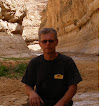Day 667.
Brasilia is the capital of Brazil, the city's name is derived from the name of the country. As early as in 1891 the Brazilian Constitution accepted the clause that in future the capital of the state - Rio de Janero - would to be transferred to a new city.
In 1956 during the election Juscelino Kubitschek promised that when he is the president the country would get the new capital. The town planning competition was won by the architect Lucio Costa and the architect Oscar Niemeyer planned public buildings.

The plan - approved by Congress in 1956. The city – built on an empty place – resembles to the image of a bow and arrow, or a bird, or the shape of a plane. The selected location - 125 km away from the railway line, 190 km from the nearest airport and the nearest paved road was 600 miles away, and the wood and the steel had to be brought from a distance of 1200 km (source: RG Brazil).
The town was designed and constructed as the new capital of the country, and it took 41 months (1956-1960). The official opening was on April 21, 1960, although the town was not yet completed, for example – the elephant- presented to the town by the Ethiopian emperor Haile Selassie – was kept in a rope by a tree until the building of the Zoo was completed.

A good overview of the city is usually achieved by climbing somewhere higher and the same thing here. The TV Tower is almost in the centre of Brazil and although one can`t get very high - the viewing platform is above the surrounding buildings.

In the middle of the town the main street Eixo Monumental is half a kilometre wide. There is a green space in the middle of it, the bus station is a bit further on and the white Parliament Building is at the end of the green area. There are 6 lanes on each side of the road. And the turnover is solved in a very non-traditional way - in several places with the left-hand-traffic.

At the end of the street there is the right hand traffic again.


Cathedral of Brasilia, architect Niemeyer, opened in 1970.

And from a little farther.

The entrance to the cathedral is through a dark underground tunnel.


Some more of Niemeyer`s creation.

"Cultural Complex of the Republic" is next to the Cathedral

First - the National Museum - 14500 square meters of exhibit space, two halls of 780 seats each.


Inside on the second floor.




The Ministry buildings are on either side of the road. The hotels have a separate sector and so have the banks. And the 124 embassies as well.

At the end of the Eixo monumental there is a square - Praca dos Tres Poderes or the Square of the Three Powers . Beyond is the official residence of the President. The sculpture in the forefront is dedicated to the builders of the town.

The world's heaviest flag - 600 kg.

The Supreme Court is on the other side.

And the Parliament Building is on the third side.

The building of the Central Bank.

The Bridge of Juscelino Kubitschek. Built in 2000-2002.


Palacio da Alvorada - the residence of the President.

The Memorial to the Indigenous People.

The memorial of President Juscelino Kubitscheki.

The display stand of gifts.

In short we can say that the city has plenty of interesting places. In addition, the city of Brasilia belongs to the list of UNESCO World Heritage Site.
The traffic was normal, which meant that when the workday was over at six o'clock there were some traffic jams on the outgoing roads, but not this kind as in Sao Paulo on Friday nights. At noon the traffic was sparse, although the entire city has been planned considering the car road users, not pedestrians. Finding a parking place was also no problem and nobody wanted any money.
Overnight places. Like in some other major cities (Sao Paulo, Rio de Janeiro) not very much has been thought of car-tourists. It was said that there is no public campsite in town, but thanks to the new acquaintances met in Rio I managed to stay for 4 days in a place called "Clube do Congresso Camping", which was meant only for the members of the club.

Quiet, safe. Electricity , the tap was beside the car, about 100 m away shower with cold and hot water (there was no difference between them, so both were about 30 degrees), but no Wi-Fi.

And in the end one more attraction of Brasilia, Sanctuario Dom Bosco. Further reading about this interesting and original city:Link







No comments:
Post a Comment